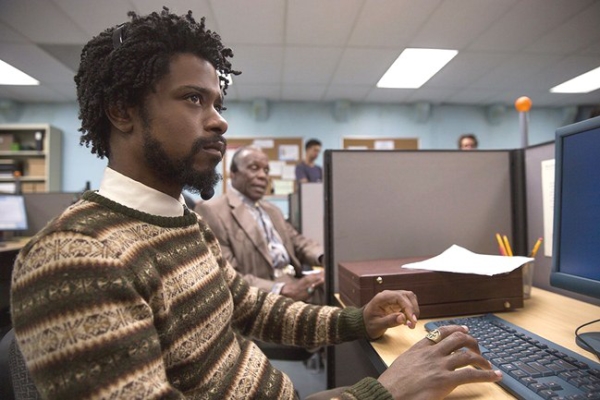Boots Riley, who has specialized in politically charged music via his group the Coup, directs this dark, surreal comedy with a satirical edge. It centers on Cassius Green (Lakeith Stanfield), a young African American male living in Oakland who has no job or much in the way of employable skills. Desperation leads him to beg for work at RegalView, a drab telemarketing company, where even the boss tells him to temper his excitement. “We’re not mapping the f—— human genome,” he tells him early on.
On his first day, Cassius learns the best performers are invited to become power callers, the elite telemarketers who make the real money. He wants to join, but unfortunately, he has trouble closing on a sale—or getting people not to hang up on him. Then a grizzled coworker (Danny Glover) suggests Cassius might be more successful utilizing what he calls a “white voice,” which he describes as “what white people think they’re supposed to sound like,” in other words, carefree and financially secure. Cassius gives it a try (his “white voice” is dubbed by actor/comedian David Cross, and the juxtaposition is as amusing as it sounds). Before long his career takes off.
The film, which marks Riley’s directorial debut, is a morality tale about the evils of selling out. Cassius must decide whether or not to leverage his new success to make life better for his coworkers-turned-friends, which include his girlfriend, Detroit (Tessa Thompson), and an undercover union agitator (Steven Yeun). Initially, Cassius has a perfectly altruistic reason to take the money, as his uncle (Terry Crews) will lose the family house without an influx of cash. But to his credit, Riley, who also wrote the screenplay, doesn’t let his main protagonist off so easily, repeatedly hinting not too subtly at Cassius’ materialistic side—indeed, his totem is a photograph of a flashy car, which he constantly stares at longingly.
As a director, Riley’s comedy can be described as playful, maybe to the point of self-indulgence. The film is full of elaborate visual flourishes that are exciting to behold but do not always stand up to scrutiny. One recurring sight gag involves Cassius literally dropping into the same physical space of whoever he calls on the phone. Though funny the first few times, it becomes overused, and the significance of the device is unclear. Is the rejection supposed to be more personal to him because it’s face-to-face? The film has too short of an attention span and doesn’t spend enough time on character development to make that clear.
Perhaps the key to a better understanding of Sorry to Bother You is in a scene about midway through, when Detroit, who is also a performance artist, appears onstage in only a bikini that consists of what look like very strategically placed gloved hands. It grabs our attention through its sheer provocativeness, even if what it says about Detroit or her art remains oblique. The film offers many such show-stopping moments, especially during the second half, when Cassius finds himself at an orgiastic party in which his dignity, ambitions, and identity are gradually peeled away by a racist corporate dictator (Armie Hammer) with unspeakably evil ideas. It’s a well-executed set piece that makes us react at various points with empathy, laughter, and terror.
Though occasionally uneven, Riley’s first directorial boasts effective world-building. Its bleakly funny dystopia has recognizable analogues to reality, including a corporation that specializes in hiring African Americans to work in prison-like settings under lifetime contracts for the fastest-growing employer in the country and an extremely popular game show in which contestants are beaten to a bloody pulp for a live audience’s enjoyment. It’s arguably not so different from the world we live in, which is a truly bothersome realization to make, although I would wager Riley is not the least bit sorry about that.







Leave A Comment